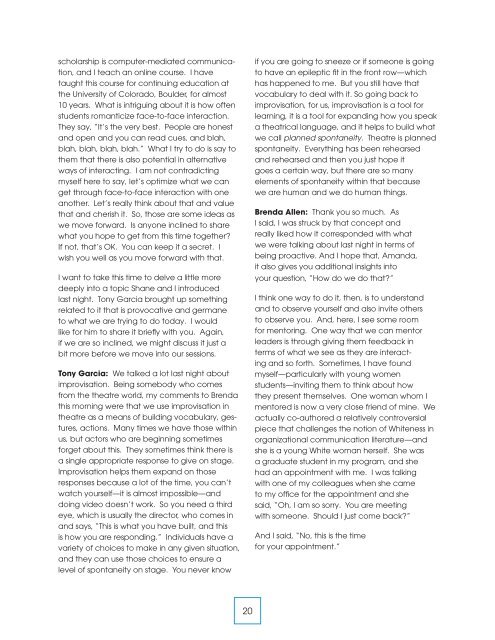The New Face of Arts Leadership in the West - westaf - The Western ...
The New Face of Arts Leadership in the West - westaf - The Western ...
The New Face of Arts Leadership in the West - westaf - The Western ...
Create successful ePaper yourself
Turn your PDF publications into a flip-book with our unique Google optimized e-Paper software.
scholarship is computer-mediated communication,<br />
and I teach an onl<strong>in</strong>e course. I have<br />
taught this course for cont<strong>in</strong>u<strong>in</strong>g education at<br />
<strong>the</strong> University <strong>of</strong> Colorado, Boulder, for almost<br />
10 years. What is <strong>in</strong>trigu<strong>in</strong>g about it is how <strong>of</strong>ten<br />
students romanticize face-to-face <strong>in</strong>teraction.<br />
<strong>The</strong>y say, “It’s <strong>the</strong> very best. People are honest<br />
and open and you can read cues, and blah,<br />
blah, blah, blah, blah.” What I try to do is say to<br />
<strong>the</strong>m that <strong>the</strong>re is also potential <strong>in</strong> alternative<br />
ways <strong>of</strong> <strong>in</strong>teract<strong>in</strong>g. I am not contradict<strong>in</strong>g<br />
myself here to say, let’s optimize what we can<br />
get through face-to-face <strong>in</strong>teraction with one<br />
ano<strong>the</strong>r. Let’s really th<strong>in</strong>k about that and value<br />
that and cherish it. So, those are some ideas as<br />
we move forward. Is anyone <strong>in</strong>cl<strong>in</strong>ed to share<br />
what you hope to get from this time toge<strong>the</strong>r?<br />
If not, that’s OK. You can keep it a secret. I<br />
wish you well as you move forward with that.<br />
I want to take this time to delve a little more<br />
deeply <strong>in</strong>to a topic Shane and I <strong>in</strong>troduced<br />
last night. Tony Garcia brought up someth<strong>in</strong>g<br />
related to it that is provocative and germane<br />
to what we are try<strong>in</strong>g to do today. I would<br />
like for him to share it briefly with you. Aga<strong>in</strong>,<br />
if we are so <strong>in</strong>cl<strong>in</strong>ed, we might discuss it just a<br />
bit more before we move <strong>in</strong>to our sessions.<br />
Tony Garcia: We talked a lot last night about<br />
improvisation. Be<strong>in</strong>g somebody who comes<br />
from <strong>the</strong> <strong>the</strong>atre world, my comments to Brenda<br />
this morn<strong>in</strong>g were that we use improvisation <strong>in</strong><br />
<strong>the</strong>atre as a means <strong>of</strong> build<strong>in</strong>g vocabulary, gestures,<br />
actions. Many times we have those with<strong>in</strong><br />
us, but actors who are beg<strong>in</strong>n<strong>in</strong>g sometimes<br />
forget about this. <strong>The</strong>y sometimes th<strong>in</strong>k <strong>the</strong>re is<br />
a s<strong>in</strong>gle appropriate response to give on stage.<br />
Improvisation helps <strong>the</strong>m expand on those<br />
responses because a lot <strong>of</strong> <strong>the</strong> time, you can’t<br />
watch yourself—it is almost impossible—and<br />
do<strong>in</strong>g video doesn’t work. So you need a third<br />
eye, which is usually <strong>the</strong> director, who comes <strong>in</strong><br />
and says, “This is what you have built, and this<br />
is how you are respond<strong>in</strong>g.” Individuals have a<br />
variety <strong>of</strong> choices to make <strong>in</strong> any given situation,<br />
and <strong>the</strong>y can use those choices to ensure a<br />
level <strong>of</strong> spontaneity on stage. You never know<br />
if you are go<strong>in</strong>g to sneeze or if someone is go<strong>in</strong>g<br />
to have an epileptic fit <strong>in</strong> <strong>the</strong> front row—which<br />
has happened to me. But you still have that<br />
vocabulary to deal with it. So go<strong>in</strong>g back to<br />
improvisation, for us, improvisation is a tool for<br />
learn<strong>in</strong>g, it is a tool for expand<strong>in</strong>g how you speak<br />
a <strong>the</strong>atrical language, and it helps to build what<br />
we call planned spontaneity. <strong>The</strong>atre is planned<br />
spontaneity. Everyth<strong>in</strong>g has been rehearsed<br />
and rehearsed and <strong>the</strong>n you just hope it<br />
goes a certa<strong>in</strong> way, but <strong>the</strong>re are so many<br />
elements <strong>of</strong> spontaneity with<strong>in</strong> that because<br />
we are human and we do human th<strong>in</strong>gs.<br />
Brenda Allen: Thank you so much. As<br />
I said, I was struck by that concept and<br />
really liked how it corresponded with what<br />
we were talk<strong>in</strong>g about last night <strong>in</strong> terms <strong>of</strong><br />
be<strong>in</strong>g proactive. And I hope that, Amanda,<br />
it also gives you additional <strong>in</strong>sights <strong>in</strong>to<br />
your question, “How do we do that?”<br />
I th<strong>in</strong>k one way to do it, <strong>the</strong>n, is to understand<br />
and to observe yourself and also <strong>in</strong>vite o<strong>the</strong>rs<br />
to observe you. And, here, I see some room<br />
for mentor<strong>in</strong>g. One way that we can mentor<br />
leaders is through giv<strong>in</strong>g <strong>the</strong>m feedback <strong>in</strong><br />
terms <strong>of</strong> what we see as <strong>the</strong>y are <strong>in</strong>teract<strong>in</strong>g<br />
and so forth. Sometimes, I have found<br />
myself—particularly with young women<br />
students—<strong>in</strong>vit<strong>in</strong>g <strong>the</strong>m to th<strong>in</strong>k about how<br />
<strong>the</strong>y present <strong>the</strong>mselves. One woman whom I<br />
mentored is now a very close friend <strong>of</strong> m<strong>in</strong>e. We<br />
actually co-authored a relatively controversial<br />
piece that challenges <strong>the</strong> notion <strong>of</strong> Whiteness <strong>in</strong><br />
organizational communication literature—and<br />
she is a young White woman herself. She was<br />
a graduate student <strong>in</strong> my program, and she<br />
had an appo<strong>in</strong>tment with me. I was talk<strong>in</strong>g<br />
with one <strong>of</strong> my colleagues when she came<br />
to my <strong>of</strong>fice for <strong>the</strong> appo<strong>in</strong>tment and she<br />
said, “Oh, I am so sorry. You are meet<strong>in</strong>g<br />
with someone. Should I just come back?”<br />
And I said, “No, this is <strong>the</strong> time<br />
for your appo<strong>in</strong>tment.”<br />
20


